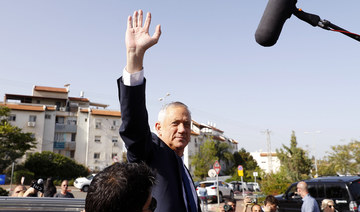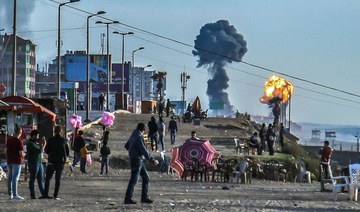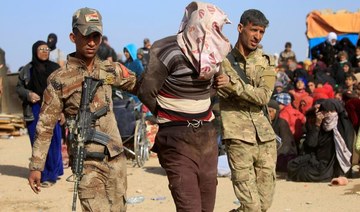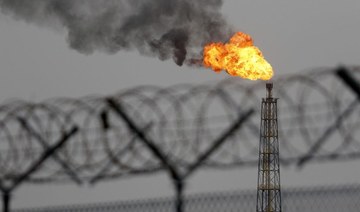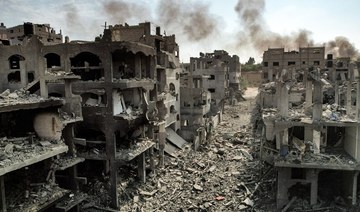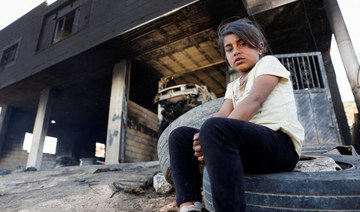JERUSALEM: When Palestinian preschooler Aisha a-Lulu came out of brain surgery in a strange Jerusalem hospital room, she called out for her mother and father. She repeated the cry over and over, but her parents never came.
Instead of a family member, Israeli authorities had approved a stranger to escort Aisha from the blockaded Gaza Strip to the east Jerusalem hospital. As her condition deteriorated, the child was returned to Gaza unconscious. One week later, she was dead.
A photo of Aisha smiling softly in her hospital bed, brown curls swaddled in bandages, drew an outpouring on social media. The wrenching details of her last days have shined a light on Israel’s vastly complex and stringent system for issuing Gaza exit permits.
It is a bureaucracy that has Israeli and Palestinian authorities blaming each other for its shortfalls, while inflicting a heavy toll on Gaza’s sick children and their parents.
“The most difficult thing is to leave your child in the unknown,” said Waseem a-Lulu, Aisha’s father. “Jerusalem is just an hour away, but it feels as though it is another planet.”
So far this year, roughly half of applications for patient companion permits were rejected or left unanswered by Israel, according to the World Health Organization. That has forced over 600 patients, including some dozen children under 18, to make the trek out of the territory alone or without close family by their side.
The system stems from Hamas’ takeover of Gaza in 2007, when it ousted the Western-backed Palestinian Authority. Israel and Egypt responded by imposing a blockade that tightly restricted movement in and out of Gaza.
The blockade, which Israel says is necessary to prevent Hamas from arming, has precipitated a financial and humanitarian crisis in the enclave. For years, Gaza’s 2 million residents have endured rising poverty and unemployment, undrinkable groundwater and frequent electricity outages. Public hospitals wrestle with chronic shortages of drugs and basic medical equipment.
In what it portrays as a humanitarian gesture to help Gaza’s civilians, Israel permits Palestinian patients to seek medical treatment at hospitals in Israel and the West Bank once they pass a series of bureaucratic hurdles. COGAT, the Israeli defense body that issues the permits, says it insists that all patients cross with an escort, usually a close relative, unless they wish to go alone or require immediate treatment that doesn’t allow time for security screening.
In order to get a permit, patients must first submit a diagnosis to the West Bank-based Palestinian Health Ministry, proving that their treatment is not available in Gaza. Then a Palestinian liaison requests exit permits from COGAT, which reviews the applications and passes them to Israel’s Shin Bet security agency for background checks.
According to WHO, the approval rate has plummeted in recent years.
It said that in 2012, Israel allowed in 93% of patients and 83% of their companions for treatment. For the month of April 2019, the figure stands at just 65% of patients and 52% of their companions.
A COGAT official disputed the figures, saying they don’t take into account that the number of permit applications has grown as Gaza’s health care system deteriorates, and that Israel has started issuing permits less regularly but for prolonged stays. The official, speaking on condition of anonymity under agency rules, said COGAT has tried to ease restrictions by designating a permit specifically for parents of child patients.
The agency said it issued 4,000 permits for patient escorts in the first quarter of 2019, including 1,398 for parents of sick children.
After being diagnosed with brain cancer, Aisha received immediate approval to get out of Gaza for what was hoped to be life-saving surgery. But when her parents approached the Palestinian Civil Affairs Commission for escort permits, their process ground to a halt.
To their bewilderment, Palestinian officials told them not to apply, saying it was too risky.
At 37, Waseem is below the age that Israel deems acceptable for swift entry on security grounds. Today, all men under 55 require extra screening, which means waiting, usually for months, according to Mor Efrat, the Gaza and West Bank director for Physicians for Human Rights Israel. As for Aisha’s mother, Muna, a quirk of her upbringing in Egypt left her without an official Israeli-issued ID card required to receive a permit.
“We tell families to find a companion that won’t give Israel any reason to refuse,” said Osama Najar, spokesman for the Palestinian Health Ministry. “We want to save the child and, yes, that can mean sending them alone.”
In this sense, the Palestinian Authority “acts as a subcontractor for Israel,” said Efrat, forcing parents to make a difficult choice: delay their child’s urgent care, or search for someone else that Israel would be more likely to let cross.
Aisha’s parents said they scoured for alternatives, applying for an aunt and her 75-year-old grandmother, but Israel rejected both.
The girl’s only remaining hope, the Palestinian office told them, was to apply for as many older women as possible from their extended social network. A permit for Halima Al-Ades, a remote family acquaintance whom Aisha had never met, was approved.
Muna said she had no choice but to sign COGAT’s consent form and whisk her daughter out of Gaza for immediate treatment. She said the frustration of the sprawling bureaucracy, and the painful memory of her 5-year-old daughter crying for her on the phone during her last days, haunts her.
“It was the hardest time of my life,” she said. “My heart was being ripped out every day and every hour.”
The Shin Bet declined to comment on the case. But in a statement, it emphasized Israel’s security concerns about Gaza patients and their companions. “The terrorist organizations in the Gaza Strip, headed by Hamas, are working tirelessly to cynically exploit the humanitarian and medical assistance provided by Israel,” it said.
This means that Palestinians are often turned down without explanation or for reasons out of their control. “I feel confident telling you that most of these rejections are arbitrary,” said Efrat, of Physicians for Human Rights Israel.
Israel denies any official change in policy.
Alon Eviatar, a former high-ranking official with COGAT, said the goal remains the same. “On the ground, this means to make daily life as difficult as possible for Hamas, without crossing the red line to humanitarian disaster,” he said.
Eviatar acknowledged that the Israeli permit system was ineffective, inefficient and overburdened. “We are desperate for an alternative, to get Gaza to take care of itself and stop relying on Israel,” he said.
Aisha’s doctor in Jerusalem, Ahmad Khandaqji, said he has treated countless lone patients from Gaza over the past year, but that Aisha’s story stuck with him. “She felt abandoned and betrayed,” he said. “We saw how that directly impacted her recovery.”
Sick Gaza child caught in Israeli permit system dies alone
Sick Gaza child caught in Israeli permit system dies alone

- The death of the Palestinian girl has drawn attention to Israel's vastly complex system for issuing travel permits to Gaza medical patients and their families
- Instead of a family member, Israeli authorities had approved a stranger to escort Aisha from the blockaded Gaza Strip to the east Jerusalem hospital
Yemen’s Houthis carry out three military operations in Gulf of Aden, Indian Ocean
CAIRO: Yemen’s Houthis said they targeted the Maersk Yorktown ship and an American warship destroyer in the Gulf of Aden as well as targeting the Israeli ship MSC Veracruz in the Indian Ocean, the Iran-aligned group’s military spokesman Yahya Sarea said in a televised speech on Wednesday.
Iraq hangs 11 convicted of ‘terrorism’: security, health sources
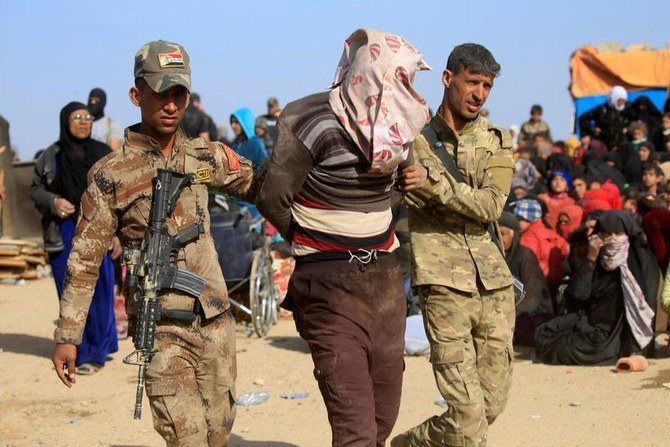
- Under Iraqi law, terrorism and murder offenses are punishable by death, and execution decrees must be signed by the president
- A security source in Iraq’s southern Dhi Qar province told AFP that 11 “terrorists from the Daesh group” were executed by hanging at a prison in Nasiriyah
NASIRIYAH, Iraq: Iraqi authorities have executed at least 11 people convicted of “terrorism” this week, security and health sources said Wednesday, with rights group Amnesty International condemning an “alarming lack of transparency.”
Under Iraqi law, terrorism and murder offenses are punishable by death, and execution decrees must be signed by the president.
A security source in Iraq’s southern Dhi Qar province told AFP that 11 “terrorists from the Daesh group” were executed by hanging at a prison in the city of Nasiriyah, “under the supervision of a justice ministry team.”
A local medical source confirmed that the health department had received the bodies of 11 executed people.
They were hanged on Monday “under Article 4 of the anti-terrorism law,” the source added, requesting anonymity due to the sensitivity of the issue.
All 11 were from Salahaddin province and the bodies of seven had been returned to their families, the medical official said.
Iraqi courts have handed down hundreds of death and life sentences in recent years for people convicted of membership in “a terrorist group,” an offense that carries capital punishment regardless of whether the defendant had been an active fighter.
Iraq has been criticized for trials denounced by rights groups as hasty, with confessions sometimes obtained under torture.
Amnesty in a statement on Wednesday condemned the latest hangings for “overly broad and vague terrorism charges.”
It said a total of 13 men were executed on Monday, including 11 who had been “convicted on the basis of their affiliation to the so-called Daesh armed group.”
The two others, arrested in 2008, “were convicted of terrorism-related offenses under the Penal Code after a grossly unfair trial,” Amnesty said citing their lawyer.
Biden says Israel must allow aid to Palestinians ‘without delay’
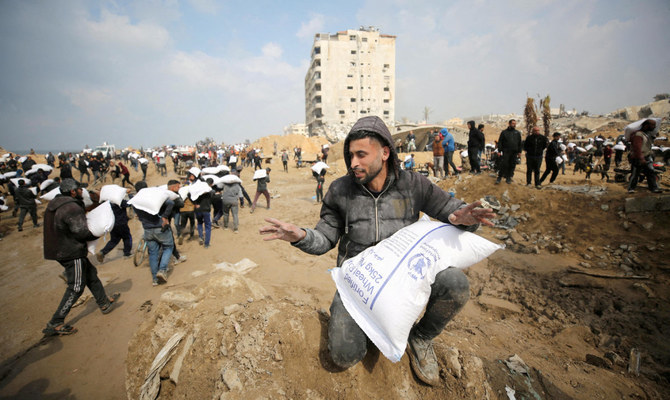
- “We’re going to immediately secure that aid and surge it,” Biden said
- “Israel must make sure all this aid reaches the Palestinians in Gaza without delay“
WASHINGTON: President Joe Biden on Wednesday demanded that new humanitarian aid be allowed to immediately reach Palestinians in the Gaza Strip as key US ally Israel fights Hamas there.
“We’re going to immediately secure that aid and surge it... including food, medical supplies, clean water,” Biden said after signing a massive military aid bill for Israel and Ukraine, which also included $1 billion in humanitarian aid for Gaza.
“Israel must make sure all this aid reaches the Palestinians in Gaza without delay,” he said.
US-Israel relations have been strained by Israel’s conduct of the war in Gaza and Israeli Prime Minister Benjamin Netanyahu’s plan to send troops into the southern Gazan city of Rafah, where 1.5 million people are sheltering, many in makeshift encampments.
“This bill significantly — significantly — increases humanitarian assistance we’re sending to the innocent people of Gaza who are suffering badly,” Biden said.
“They’re suffering the consequences of this war that Hamas started, and we’ve been working intently for months to get as much aid to Gaza as possible.”
Israel hits Lebanese border towns with 14 missiles
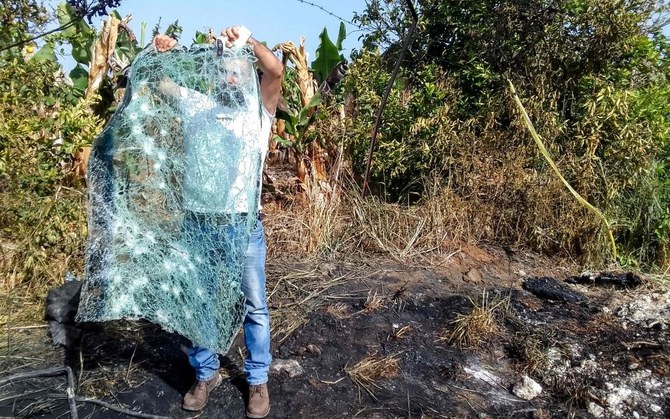
- Hezbollah targets Israeli settlements in retaliation for Hanin civilian deaths
- Hezbollah said it attacked the Shomera settlement with dozens of Katyusha rockets
BEIRUT: Clashes between Hezbollah and Israeli forces escalated sharply on Wednesday, the 200th day of conflict in southern Lebanon’s border area.
Israeli airstrikes created a ring of fire around Lebanese border towns, with at least 14 missiles hitting the area.
In the past two days, military activity in the border region has increased, with Hezbollah targeting areas in northern Acre for the first time in the conflict.
On Wednesday, Israeli strikes hit the outskirts of Aita Al-Shaab, Ramya, Jabal Balat, and Khallet Warda.
The Israeli military said it had destroyed a missile launching pad in Tair Harfa, and targeted Hezbollah infrastructure in Marqaba and Aita Al-Shaab.
Israeli artillery also struck areas of Kafar Shuba and Shehin “to eliminate a potential threat.”
Hezbollah also stepped up its operations, saying this was in retaliation for the “horrific massacre committed by the Israeli enemy in the town of Hanin, causing casualties and injuries among innocent civilians.”
A woman in her 50s and a 12-year-old girl, both members of the same family, were killed in the Israeli airstrike. Six other people were injured.
Hezbollah said it attacked the Shomera settlement with dozens of Katyusha rockets.
The group said it also targeted Israeli troops in Horsh Natawa, and struck the Al-Raheb site with artillery.
It also claimed to have killed and wounded Israeli soldiers in an attack on the Avivim settlement.
Israeli news outlets said that a rocket-propelled grenade hit a house in the settlement, setting the dwelling ablaze.
Hezbollah’s military media said that in the past 200 days of fighting with Israel, 1,998 operations had been carried out from Lebanon, Yemen and Iraq, including 1,637 staged by Hezbollah.
Egypt denies any discussions with Israel over Rafah offensive
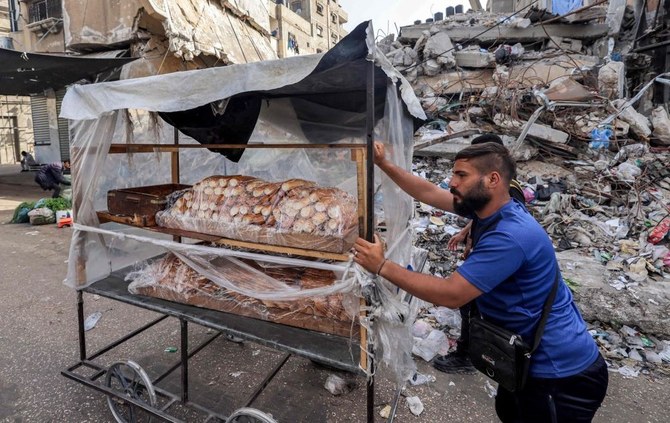
- Egypt reiterates opposition to any move on Rafah
- Warnings tell of expected losses and negative repercussions
CAIRO: Egypt has denied any discussions with Israel regarding an offensive in the Palestinian city of Rafah in the southern Gaza Strip.
Diaa Rashwan, the head of Egypt’s State Information Service, has refuted what has been claimed in one of the major American newspapers: that Egypt has discussed with the Israeli side its plans for an offensive in Rafah.
Rashwan has affirmed the Egyptian stance — announced several times by its political leadership — of complete opposition to the operation, which it is thought will lead to further massacres, massive human losses, and widespread destruction.
He added that Egypt’s repeated warnings have reached the Israeli side, from all channels, since Israel proposed carrying out a military operation in Rafah. These warnings tell of expected losses and the negative repercussions on the stability of the entire region.
Rashwan added that while Israel is contemplating its operation — which Egypt and most of the world and its international institutions stand against — Egyptian efforts since the beginning of the Israeli aggression had focused on reaching a ceasefire agreement and the exchange of prisoners and detainees.
He said Egypt was seeking the entry of humanitarian aid into the Gaza Strip, especially the north and Gaza City, and the evacuation of wounded and sick people for treatment outside the area.
Egypt has repeatedly opposed the displacement of Palestinians from Gaza and is warning against any military operation in Rafah.



